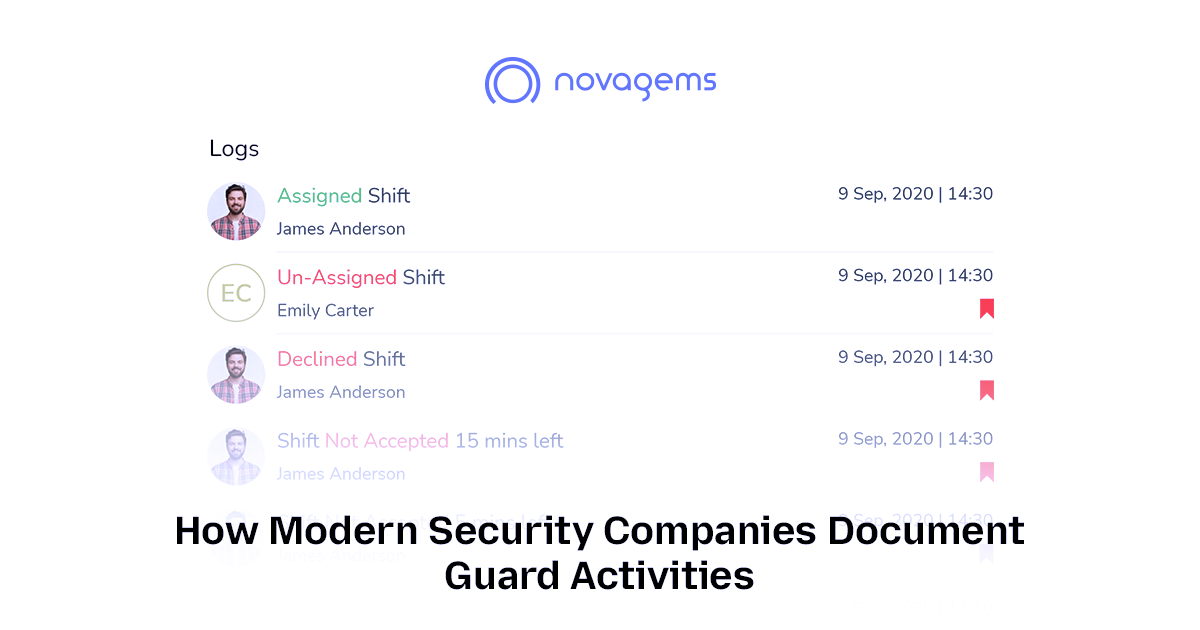Best Practices for Effective Security Guard Scheduling
Published on: Tue, Aug 6, 2024
Read in 12 minutes

Security guard scheduling may sound simple, but ask any security company manager, and you’ll hear about last-minute call-offs, night shift fatigue, coverage gaps, and frustrated guards. Scheduling directly affects guard morale, site security, and client satisfaction.
Whether you’re managing 10 guards or 1,000, building an efficient, fair, and responsive schedule is critical. In this guide, we’ll walk you through guard scheduling best practices to schedule security guards effectively, based on industry expertise, current technology trends, and proven methods used by high-performing teams.
Key Takeaways
- Strategic scheduling reduces guard fatigue and improves safety outcomes.
- Using guard scheduling software can cut shift assignment errors by up to 40%.
- Planning shifts 7–14 days in advance reduces last-minute call-offs significantly.
The world of security services is filled with unforeseen things. But that does not mean that you as a security company owner need to be juggling many tasks at once. Being a business owner is not easy, and a little help never hurts. The major task you need to deal with is security guard scheduling. As your company grows, you will need to hire more security guards to meet client’s needs and expectations. Now this may seem easy enough in the beginning but it can also cause trouble in the future.
Effective security guard scheduling is essential for ensuring that security operations run smoothly. Whether you’re managing a small team or a large force, the way you schedule your security guards can significantly impact the quality of your security services.
What is security guard scheduling?
Security guard scheduling is the organized process of assigning guards to shifts across different time periods, posts, and locations. It ensures that every location under a company’s protection is consistently staffed, day and night.
Key Components Include:
- Assigning guards to appropriate shifts and locations
- Planning 24/7 coverage, including weekends and holidays
- Managing guard availability, time-off requests, and sudden absences
- Rotating shifts to prevent burnout
- Matching guard skill sets (e.g., armed guards, surveillance experts) with post requirements
- Tracking hours to remain compliant with labor laws
In short, it’s the bridge between guard performance and client satisfaction. And while it may sound simple on paper, effective scheduling is one of the biggest operational challenges security companies face, especially as teams grow or operate across multiple locations.
Why Scheduling Matters
Scheduling isn’t just a back-office function. It’s a strategic part of your security operations. Here’s why getting it right makes a real difference:
1. Fatigue Affects Safety
According to research, night shift workers are 30% more likely to experience injuries on the job. That’s because disrupted sleep cycles lead to slower reflexes and reduced awareness, both dangerous traits in security roles.
A study from OSHA reports that working shifts longer than 12 hours increases the risk of errors and accidents by over 37%. That is why security guard shift rotation is important to keep them alert.
2. High Turnover is Expensive
Poor scheduling is one of the top reasons guards quit. In the security industry, turnover rates can reach up to 200% annually, especially among contractors. Replacing a single trained guard can cost a company $3,500–$5,000 in hiring, onboarding, and training.
However, companies that use flexible and fair scheduling methods report 20–30% improvements in guard retention.
3. Poor Scheduling Harms Morale
When guards get assigned unfair workloads (e.g., repeated night shifts or last-minute calls), morale drops. This leads to more absences, less effort on the job, and ultimately, unhappy clients.
On the flip side, scheduled consistency improves:
- Team trust
- Guard accountability
- Site performance ratings
4. Legal Compliance
Labor law violations from overworking guards or not giving mandated rest periods can result in:
- Fines
- Contract losses
- Legal disputes
Using tools that monitor hours worked and enforce rest rules helps you stay compliant and protected.
5. Client Confidence
Clients expect your team to be on-site, alert, and ready—no matter the time or day. A smart scheduling system guarantees:
- Zero missed shifts
- Real-time visibility
- Backup in case of emergencies
This increases client satisfaction and retention
Factors to Consider When Scheduling Security Guards
To prevent any mishaps you need to have security scheduling software. If you have just started your security journey, then covering some basics is essential. Here are some key factors to consider before you schedule them:
-
Skill Matching
When scheduling security guards, it’s crucial to match their skills and experience with the specific needs of the post. For example:
- Event Security: Guards with strong communication skills and crowd management experience are ideal for events.
- CCTV Monitoring: Assign guards who are tech-savvy and can efficiently monitor surveillance systems.
- Front Desk Security: Guards with good interpersonal skills and a calm demeanor are best suited for roles involving public interaction.
Don’t assign guards randomly. Each site has different requirements. For example:
- Armed posts need licensed guards
- VIP locations need trained customer service guards
- Tech-heavy sites (CCTV or alarm panels) require tech-savvy staff
Use a skills matrix to match guards to roles.
By aligning guard skills with specific duties, you ensure that each post is managed by someone capable of handling the unique challenges it presents.
-
Shift Rotation and Guard Fatigue
Another important aspect of security guard scheduling is managing shift rotations. Security work often involves long hours and the need for vigilance, which can lead to fatigue if not managed properly. To prevent burnout:
- Rotate Shifts: Avoid scheduling the same guard for consecutive night shifts. Rotate shifts to give guards time to recover.
- Adequate Rest: Ensure that guards have enough time off between shifts to rest and recharge. This helps maintain high levels of alertness and performance.
Use Smart Rotation Systems
Instead of repeating the same guard on night duty or back-to-back shifts, rotate their schedules using models like:
- 2-2-3 Shift: Two days on, two off, three on
- 4-on/4-off Shift: Guards work four 12-hour shifts and get four days off
- Day/Night Alternating Weekly
Properly managing shift rotations not only improves the well-being of your guards but also enhances the overall effectiveness of your security services.
-
Compliance with Labor Laws
Security companies must adhere to labor laws and regulations when scheduling guards. This includes:
- Maximum Working Hours: Ensure that guards do not exceed the maximum allowable working hours.
- Breaks and Overtime: Provide adequate breaks during shifts and properly manage overtime to avoid overworking your staff.
- Fair Scheduling Practices: Ensure that your scheduling practices are fair and equitable, giving all guards equal opportunities for preferred shifts.
Laws vary by region, but common rules include:
- No more than 48 hours/week on average
- Mandatory 11-hour rest between shifts
- Weekly days off
- Paid breaks and overtime tracking
Failing to comply can mean legal fines, contract loss, or forced shutdowns.
By complying with labor laws, you protect your company from legal issues and foster a positive working environment for your security guards.
Strategies for Optimizing Security Guard Schedules
Optimizing your security guard scheduling process is crucial for maintaining high-quality security services while also meeting the needs of your guards. Here are some strategies to consider:
-
Use Security Scheduling Software
Investing in security scheduling software can significantly improve the efficiency of your scheduling process. Here’s how:
- Easy Scheduling: The software can create schedules based on guard availability, skills, and site requirements. This reduces the chances of human error and ensures that all shifts are covered effectively.
- Real-Time Adjustments: Security scheduling software allows for real-time updates, making it easier to handle last-minute changes or emergencies. Managers can quickly adjust schedules and notify guards of any changes.
- Reporting and Analytics: The software provides valuable insights into your scheduling patterns. The security guards can make reports of their shifts and keep everyone informed.

By using security scheduling software, security companies can save time, reduce errors, and ensure that their guards are always in the right place at the right time.
-
Flexible Shifts
Offering flexible shifts can help accommodate the personal needs of your guards. This leads to higher job satisfaction and retention. Consider the following:
- Part-Time and On-Call Shifts: For guards who prefer not to work full-time, offering part-time or on-call shifts can be an attractive option. This flexibility helps you meet varying client needs while keeping your guards happy.
- Rotating Schedules: Implement a rotating schedule that allows guards to work different shifts each week. This prevents monotony and helps guards maintain a healthy work-life balance.
Keep a trained list of backup guards on call for:
- Sick leaves
- Emergencies
- Increased foot traffic or events
These guards should be briefed, certified, and capable of stepping in on short notice.
Flexible scheduling not only benefits your security guards but also ensures that your security services are reliable and responsive to client demands. This will help you cover the high-demand requests of clients too.
-
Peak Time Coverage
Ensuring adequate coverage during peak times is critical for effective security management. To do this:
- Analyze Data: Use historical data to identify periods of high activity, such as weekends, holidays, or special events. This will help you anticipate when more guards are needed.
- Strategic Scheduling: Schedule additional guards during these peak times to ensure full coverage. This can include bringing in part-time or on-call guards to handle the increased demand.
By planning ahead and strategically scheduling your guards, you can maintain a high level of service during busy periods, reducing the risk of incidents.
Main Scheduling Challenges
Despite its importance, many security teams struggle to implement good scheduling systems. Below are common roadblocks and their impact:
1. Last-Minute Call-Offs
Guards may call in sick, forget a shift, or face emergencies. If you don’t have a system to detect gaps and fill them instantly, you risk uncovered posts—a huge liability.
2. Manual Scheduling Errors
Using Excel sheets or whiteboards for scheduling leads to:
- Double bookings
- Missed shifts
- Conflicting assignments
- No centralized access
As teams grow, these errors increase and waste valuable time.
3. Night Shift Fatigue
Rotating night and day shifts without planning increases fatigue, reduces guard alertness, and leads to a higher risk. Guards working more than 4 consecutive night shifts often show:
- Mood disturbances
- Slow reaction times
- Sleep disruption
4. Uneven Workload Distribution
Some guards may get overbooked while others remain underutilized. This causes frustration and resentment, leading to internal friction.
Example: A reliable guard may get 6 straight 12-hour shifts while another gets only 2 in a week, creating imbalance and burnout.
5. Poor Communication
If guards aren’t notified when schedules change, they:
- Miss shifts
- Arrive late
- Show up at the wrong site
Lack of real-time communication is one of the most cited causes for no-shows in the security industry.
Enhancing Security Service with Staff Scheduling Software
Security scheduling software is a powerful tool that can enhance the effectiveness of your security services. Here’s how:
Real-Time Updates and Communication
One of the biggest advantages of using security scheduling software is the ability to make real-time updates. This ensures that:
- Immediate Notifications: Guards receive instant notifications of any schedule changes, reducing confusion and ensuring they are always aware of their duties.
- Improved Coordination: Managers can easily communicate with guards, coordinating their movements and ensuring that all posts are covered.

Real-time updates enhance the efficiency of your operations and ensure that your security services remain reliable. Even in the face of unexpected changes. This way you can become the top choice for potential clients and close more deals.
Compliance and Tracking
Security scheduling software also helps ensure compliance with labor laws by:
- Tracking Hours Worked: The software tracks the hours each guard works, ensuring that they do not exceed the maximum allowed by law. This prevents overworking and ensures that all guards are fairly compensated for their time.
- Managing Overtime: The software can automatically calculate and manage overtime, ensuring that guards are paid correctly and that your company remains compliant with labor regulations.
By automating compliance tasks, security companies can focus on delivering high-quality security services without worrying about legal issues.
Data-Driven Decision Making
The reporting features of security scheduling software provide valuable data that can be used to optimize your scheduling process. For example:
- Identifying Trends: Analyze scheduling patterns to identify which shifts are the busiest or most challenging. This allows you to allocate resources more effectively.
- Performance Monitoring: Track guard performance over time, using data to identify top performers and those who may need additional training.
By making data-driven decisions, you can continuously improve your security guard scheduling process, leading to better performance and higher client satisfaction.
Post Schedules Early
Ideally, post the next week’s schedule at least 7 days in advance.
Benefits:
- Reduces absenteeism
- Gives guards time to request changes
- Improves overall transparency
- Helps identify conflicts earlier
Enable Self-Scheduling (for Trusted Guards)
Allow senior or reliable guards to:
- Bid for preferred shifts
- Swap with peers (manager-approved)
- Set unavailability
Studies show self-scheduling improves guard engagement and accountability.
Balance Workloads Fairly
Use your scheduling tool to monitor hours assigned per guard weekly.
Avoid:
- More than 3 consecutive night shifts
- Repeating 12-hour shifts without breaks
- Guarding high-stress sites multiple days in a row
Balanced workload = better morale = fewer absences.
Standardize with Templates
Use weekly shift templates for similar sites. Example:
- Malls: 3 shifts (morning, evening, overnight)
- Construction: 2 shifts (day/night)
- Corporate: 8-to-8 single coverage
This saves time and improves consistency.
Use Real-Time Communication
Send shift reminders and changes via:
- Mobile app notifications
- SMS alerts
- Email summaries
Let guards confirm availability, request swaps, or report issues within the app. This reduces no-shows and last-minute confusion.
Implement staff scheduling software
Automation can save 5–8 hours weekly for managers. Look for platforms like:
- Novagems – Built for real-time workforce scheduling, GPS tracking, and shift swaps
- Connecteam – Good for mobile-first operations
- TARGPatrol – Specializes in tour tracking and scheduling
Core features to look for:
- Auto-assignment of shifts
- Guard availability status
- Shift swap approvals
- Notifications and alerts
Conclusion
Effective security guard scheduling is essential for maintaining high standards in your security services. You can create schedules that meet both operational needs and guard well-being. Implementing strategies such as using security scheduling software, offering flexible shifts, and ensuring peak time coverage. And with this, you further enhance the effectiveness of your schedules.
Security companies that invest in security scheduling software gain the ability to manage their operations more efficiently. Not only that but also reduce human error, and provide better service to their clients. By using security guard software you can optimize your scheduling process easily and without any error. Hence leading to improved performance, higher client satisfaction, and a more motivated workforce.
Get a Free Trial
Sign up For Newsletter
Latest Blog Posts
Get Started
Start being productive & grow your business
with Novagems





